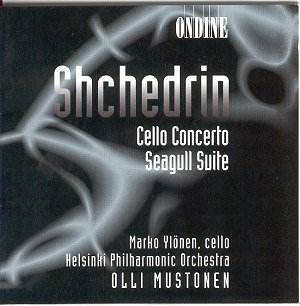Rodion SHCHEDRIN (b.1932)
Cello Concerto Sotto Voce Concerto (1994)
Seagull Suite (1984)
 Marko Ylönen (cello)
Marko Ylönen (cello)
Helsinki PO/Olli Mustonen
rec May 1999 Jan 2000, Helsinki
 ONDINE ODE 955-2
[59.43]
ONDINE ODE 955-2
[59.43]
Crotchet
Amazon
UK Amazon US

This takes me back to 1998 when I first began reviewing for the site.
BMG-Melodiya were good enough to support us at that time by allowing us review
copies of some of their (still available) Shchedrin series. These included
the first two symphonies and the three piano concertos (there are five now)
with the Fifth premiered in Los Angeles in 1999 by Mustonen, its dedicatee.
Mustonen is as capable a pianist as he is a conductor.
Shchedrin is known for his Carmen ballet written for a supercharged
vast string band and a battery of percussion. The ballet is an overwhelming
work in virtuoso hands.
The composer is a Muscovite who studied with Yakov Flier (piano) and composition
with Yuri Shaporin. He refused to conform to Soviet norms and maintained
links with exiled dissidents such as Rostropovich. He now divides his time
between Munich and Russia. His Third Symphony (Sinfonia Concertante)
has been written for Lorin Maazel and the Bayerische Rundfunk.
The two works on this disc are powerfully atmospheric. The cello concerto
is driven by sincere conviction shining through a nostalgic impulse. That
impulse traces its way to the obliteration of a town (Aleksin, on the river
Oka) which was one of his childhood haunts. The town of his memory was bulldozed
and in its place the Soviet régime constructed soulless apartment
blocks. The experience of returning to a place that was the same in only
name has born three concertos. This triptych comprises concertos for cello
(Rostropovich), Viola (Bashmet) and Violin (Vengerov). The cello work is
suggestive rather than experiential. It wrestles with expression in cell-like
figures; easy melody is not Shchedrin's way. Neither is it entirely
uningratiating: an innocent village organ wheezes and its sound seems to
melt in the heat of memory in the fourth track. At 12.30 in track 4 the cello
at the highest reach whispers and skitters its way into the stratosphere
and silence. The work suggests the more morose stretches of the Shostakovich
second cello concerto with Bach-like incursions. This work does not have
the surface glamour of Tavener nor the dramatic grip of the Sallinen Concerto.
Its experience parallels that of the St Kilda Symphony by Jerold James
Gordon - a work written in the 1980s reflective of the dispossession of the
St Kildans.
The Seagull suite is made up of seven movements based on Chekhov's
play. No movement is longer than 4.52. This is restless more demonstrative
music but downbeat consistent with the gloom of the original. The mood is
lightened (or perhaps intensified) by the flickering interludes which dance
in rapid unrest like a collision between Kastchei's skittering
Firebird, Tchaikovsky's Dance of the Flowers and a feral Prokofiev
waltz.
I hope that Ondine will now turn to the other two Aleksin concertos (the
cello concerto is the longest of the three) and couple them on one disc.
Rob Barnett

